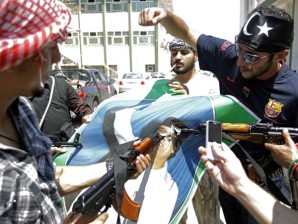
GADHAFI ‘DEFACED’. Libyan rebel fighters from Tripoli brigade deface a portrait of Libyan dictator Moammar Gadhafi in Tripoli, Libya, Monday, Aug. 22, 2011. Libyan rebels claimed to be in control of most of the Libyan capital on Monday after their lightning advance on Tripoli heralded the fall of Moammar Gadhafi's nearly 42-year regime, but scattered battles erupted and the mercurial leader's whereabouts remained unknown.(AP Photo/Sergey Ponomarev)
(AP reporters Ben Hubbard and Karin Laub were traveling with rebels as they made their way into Tripoli from the west. This is their account of the day’s historic events.-AP Editors)
TRIPOLI, Libya— Our drive to Tripoli started with news of a prison break and ended with a party.
Around noon Sunday, we were waiting at a rebel checkpoint in the coastal town of Jedaim, on the main road to the Libyan capital, the main stronghold of Moammar Gadhafi’s regime.
All morning, rebel trucks with mounted guns had been rushing forward to clash with Gadhafi’s forces somewhere in the 25 miles (40 kilometers) between us and the capital. Ambulances occasionally came screaming back, giving us an unclear picture of the rebels’ progress toward what could be the final stage in the six-month rebel struggle to chase Gadhafi from power.
Then we saw a barefoot man with black bags under his eyes and ratty clothes get out of a car. Cheering rebels surrounded him, firing their rifles in the air. Some told us the man had been a prisoner in a notorious army base run by one of Gadhafi’s sons outside Tripoli. Rebels had stormed the base, releasing hundreds of prisoners, they said.
Other prisoners arrived, climbing out of cars, buses and rebel trucks. Friends who hadn’t seen them since they’d been locked up months ago rushed over to embrace them.
That was our first sign of a breakthrough. If rebels had stormed the base, they would likely push for Tripoli.
We raced down the coastal road to the base to find the rebels’ tricolor flag hanging over the main gate. Rebels were everywhere, driving in and out and cheering for the hugely symbolic victory.
The base’s fall won the rebels more than glory. Inside the grounds, filled with towering eucalyptus trees, they found huge crates of munitions, which they cracked open and loaded into their trucks.
Much will serve them in the fight for Tripoli: rockets, belts of ammunition, hand grenades. One man walked off cradling two mortars like a baby.
The value of other booty was less obvious. Groups of teenagers carried off tear gas guns. Asked how they planned to use crowd-control tools in combat, one said only, “We took them from Gadhafi.” That seemed to be all that mattered to him.
Elsewhere, rebels found a large metal safe, which they tried to open by shooting at it with rifles — unsuccessfully. Another group carted off an entire living room set.
While many of the trucks headed off to collect munitions, others drove straight for Tripoli. We followed them and soon found ourselves in a two-lane parade of vehicles stretching as far as we could see.
The mass of cars was like a rolling celebration, with rebels chanting, singing and firing their guns in the air. The caravan met little resistance for huge stretches of road, pulling through towns whose names we had only seen on maps because they had until that day remained in Gadhafi’s grip.
Jubilant residents lined the road to cheer the passing trucks, many watching in disbelief as the fighters rolled by.
Gunfire — this time not celebratory — erupted in front of our car as we neared the town of Janzour, a suburb just six miles (10 kilometers) west of Tripoli. We fell back, and a local family invited us into their home, where they served us juice and fired up their generator so we could have electricity to use our computers and charge our phones.
We wanted to enter the city, but the situation inside remained murky. Telephone lines had been bad all day, but our driver managed to reach his wife in Tripoli. She said the house was surrounded with gunfire, but she had seen rebels in the streets from her window flying rebel flags on their cars. Other reports emerged that the rebels had seized the city’s central Green Square — best known as the site of sprawling pro-Gadhafi rallies.
We decided the chance to see for ourselves if rebels had taken the square was too great to miss. It was well past midnight, and most streets were eerily deserted when we arrived. Few of the cars we did see flew rebel flags, making us worry that they could belong to Gadhafi supporters who would stop us — or worse.
We eventually hit rebel checkpoints, though their disorganization made it clear they had only been set up hours before and the rebels were still unsure of their roles.
As we progressed through narrow streets lined with young men and armed rebels, the mood rose. We turned onto a tree-lined boulevard and our driver soon announced: “This is it. We have reached the square.”
It was vast and well lit, lined with banks and offices, with date palms in the center plaza. It was both familiar and strange; we had both seen it before, but in very different circumstances. Ben had seen it often on Libyan state TV, whether for pro-government rallies or speeches by the Leader of the Revolution himself. Karin had driven through it on an earlier trip, escorted by a government minder who prevented her from asking anyone what they thought.
But now it boiled in celebration. Car horns blared, rebels fired their guns overhead and chanted that the blood of the martyrs was not shed in vain. Amid the noise, two rebels lay side by side in one corner on a row of steps. They and their colleagues had been fighting for months, and they commemorated their arrival in the capital with a nap.